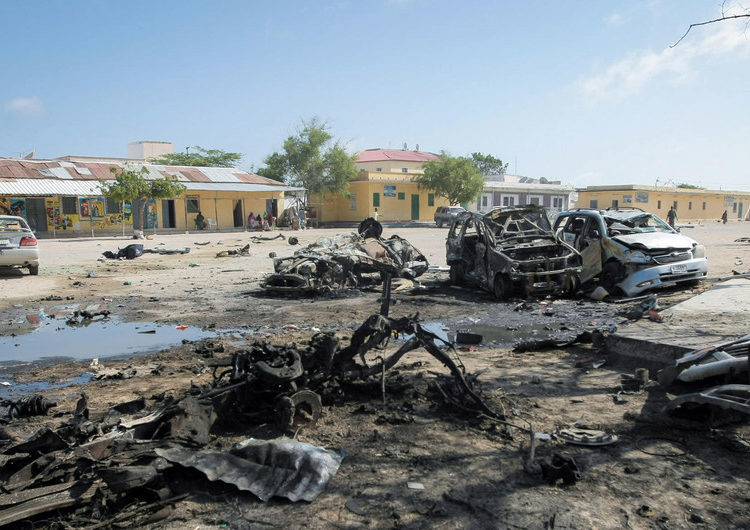Turkey’s National Intelligence Organization (MİT), led by a pro-Iranian Islamist figure, delivered hundreds of thousands of dollars to the al-Shabab terrorist organization in Somalia through a former Gitmo detainee.
The transfer of the funds was picked up by the US government, which alerted Turkish authorities and asked for an investigation into the network that enabled the funding of al-Shabab. Yet the Islamist government of President Recep Tayyip Erdoğan hushed up the probe that was launched after the notification from the office of the Under Secretary for Terrorism and Financial Intelligence, which was led by David S. Cohen at the time.
According to information incorporated in the indictment file in the case of Russian Ambassador Andrei Karlov, who was gunned down on Dec. 19, 2016 by Turkish al-Qaeda-linked police officer Mevlüt Mert Altıntaş in the Turkish capital of Ankara, the government claimed it found no evidence of such a transfer. The indictment, submitted to the court on Nov. 23, 2018, stated that Cohen’s office conveyed information showing that 37-year-old Turkish national İbrahim Şen was involved in the transfer of $600,000 to al-Shabab in September and December 2012. The Erdoğan government claimed the Financial Crimes Investigation Board (MASAK), a government agency operating under the Ministry of Finance and Treasury, which is led by Erdoğan’s son-in-law Berat Albayrak, found no evidence to support this transfer.
It is clear that the Erdoğan government wanted to hush up the probe into Şen, who was employed by the Turkish intelligence agency to move jihadists back and forth into Syria, according to the investigation file that was made public in January 2014. Şen, a convicted al-Qaeda terrorist, was detained in Pakistan over al-Qaeda links and transferred to Guantanamo, where he was kept until 2005, before US officials decided to turn him over to Turkey. According to the investigation file in Turkey, he had been working with Turkey’s MİT since the Syrian crisis erupted in 2011. Apparently due to his political cover from the government and a secret contract with MİT, Şen was saved from legal troubles. He was arrested in January 2014 and indicted in October 2014 but let go at the first hearing of the trial in October 2014. He was again arrested in 2018.
The government dropped the 2014 investigation and sacked police chiefs, prosecutors and judges who were involved in the investigation, prosecution and trial of Şen and his associates. Wiretaps obtained by prosecutors under court order exposed Şen’s links to the Turkish intelligence agency. Investigators believed that Şen used several front NGOs including the Foundation for Human Rights and Freedoms and Humanitarian Relief (İnsan Hak ve Hürriyetleri ve İnsani Yardım Vakfı, or IHH) to conceal illegal shipments to jihadists in Syria. Three people identified by the police as partners of Şen in smuggling goods to Syria are Ömer Faruk Aksebzeci (who works out of the IHH Kayseri branch), Recep Çamdalı (a member of the IHH in the Kayseri branch) and İbrahim Halil İlgi (who works out of the Kilis IHH branch). The transcripts of wiretaps between Şen and these operatives showed how they planned to use ambulances to transport goods to jihadists when the governor prohibited pick-up trucks from crossing into Syria.
Şen’s brother Abdulkadir was also listed as a suspect in the al-Qaeda case but was freed as well. He is known to be the author of books that led many young people in Turkey to radicalize. The Karlov indictment shows Abdulkadir met the Russian ambassador’s killer in person and that the gunman bought his books. Yet Turkish prosecutor Adem Akıncı brushed aside the connection of the Turkish al-Qaeda network to the assassin and discounted significant evidence in the case file about how al-Qaeda operatives helped steer the assassin into killing the Russian envoy in order to exact revenge for an intensified Russian aerial campaign against jihadist groups in Syria at the time.
The Karlov indictment file also revealed that security officials who worked in the British and French embassies in Turkey asked their Turkish counterparts in 2014 to share information about the Şen brothers, saying that their governments would apply to the United Nations 1267 Sanctions Committee based on the intelligence that jihadists who might be returning to their home countries were involved with the Şen brothers. The Turkish government claimed that MASDAK did not find any trace of the $600,000 to al-Shabab, as if MIT and al-Qaeda would use the banking system to transfer funds to a terrorist organization. This excuse is an insult to our intelligence given the fact that even development aid provided to the Somali government by the Erdoğan government was transported in bags of cash on Turkish Airlines.
Erdoğan has shown a great interest in Somalia since 2011 and ordered the construction of Turkey’s largest embassy compound in Mogadishu while building a military training center and military school. His associates secured the operating rights of both the airport and port facilities. He had appointed Cemalettin Kani Torun, a staunchly Islamist doctor, as a non-career ambassador to Mogadishu in 2011. According to Turkish government insider Fuat Avni, Kani funneled millions of dollars to Erdoğan’s business associates while he was there, until 2014. He also secretly met with al-Shabab terrorist leaders and sold them arms. Kani was rewarded for his services by Erdoğan, who appointed him chief advisor in 2014 and made him a deputy in parliament a year later.












